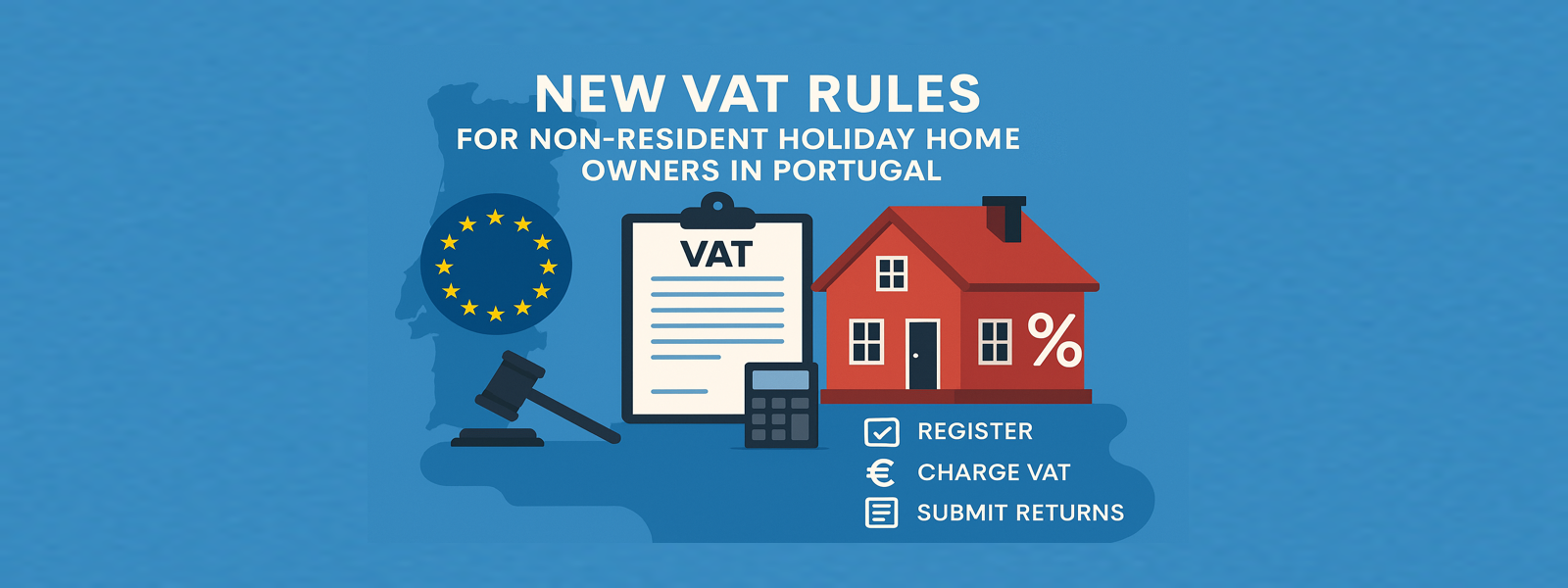

New VAT Rules for Non-Residents
![]()
If you rent out your holiday home in Portugal on a short-term basis new VAT (IVA) rules from the Portuguese government mean you will now need to register for VAT, even if your rental income is relatively low.
Until now, many non-resident property owners benefitted from a special VAT exemption (known as the Article 53 exemption) if their annual income from rentals stayed below €13,500. However, this is changing.
As of 1 July 2025, non-residents (including those living in the EU) can no longer benefit from this special exemption. That means if you live outside Portugal and earn any rental income from your property, you'll need to register for VAT under thenormal regime, charge VAT on your guest invoices, and submit regular VAT returns to the Portuguese tax authority.
For short-term accommodation, the applicable VAT rate is 6%. Once registered, you'll need to issue VAT-compliant invoices for each stay and submit quarterly (or monthly, depending on your turnover) VAT declarations.
Once you're registered under the normal VAT regime, you can also reclaim VAT on many of your property-related expenses, these may include:
- Utility bills (electricity, water and gas) - If you use the property yourself, you should claim back the IVA according to the occupancy. For example, if 20% of the occupancy was for the owner, the IVA should be claimed back on 80% of the utility bills.
- Cleaning and laundry services - for guest stays only.
- Internet and TV services - Again VAT should be claimed back according to guest occupancy.
- Guest supplies (toiletries, soap, cleaning products).
- Maintenance and minor repairs - should not include home improvements.
- Accountancy fees.
To stay compliant, you'll need to:
- Register for VAT with the Portuguese tax authority
- Begin charging VAT on rental income from 1 July 2025
- Submit VAT returns regularly (quarterly)
- Keep accurate records and invoices
The quarterly VAT returns should be done through the Finanças portal (https://www.portaldasfinancas.gov.pt). The quarters are as follows:
|
Quarter |
Period Covered |
Typical Filing Deadline |
VAT Payment Deadline |
|
Q1 |
1 January - 31 March |
20-May |
25-May |
|
Q2 |
1 April - 30 June |
20-Aug |
25-Aug |
|
Q3 |
1 July - 30 September |
20-Nov |
25-Nov |
|
Q4 |
1 October - 31 December |
20 February (of next year) |
25 February (of next year) |
If you're unsure where to begin, it's a good idea to speak to a Portuguese accountant or fiscal representative. They can help you register, handle your filings, and make sure that you're reclaiming VAT where appropriate.
To register for VAT, you or your fiscal representative must submit a Declaração de Alterações (to change from the exempt to the normal VAT regime). This can be done:
- Online through the Portal das Finanças, using your password and NIF;
- In person at a Finanças office;
- Via your fiscal representative or accountant.
In the declaration, you must:
- Opt into the normal VAT regime (regime normal de IVA);
- Indicate that you will be providing Alojamento Local (short-term accommodation) services;
- Confirm that your activity will be subject to VAT (IVA).
Once registered:
- You must issue VAT invoices (facturas com IVA) to guests;
- You must file quarterly or monthly VAT returns, depending on your annual income.
When switching from the special exemption regime (Art. 53), you must:
- File a Declaration of Changes (Declaração de Alterações) by 30 July 2025;
- Backdate the change to 1 July 2025.
These changes are part of a wider move toward consistent taxation for rental income across Portugal. By preparing now, you'll avoid any surprises and stay on the right side of the rules, while potentially saving money on your expenses through VAT recovery.